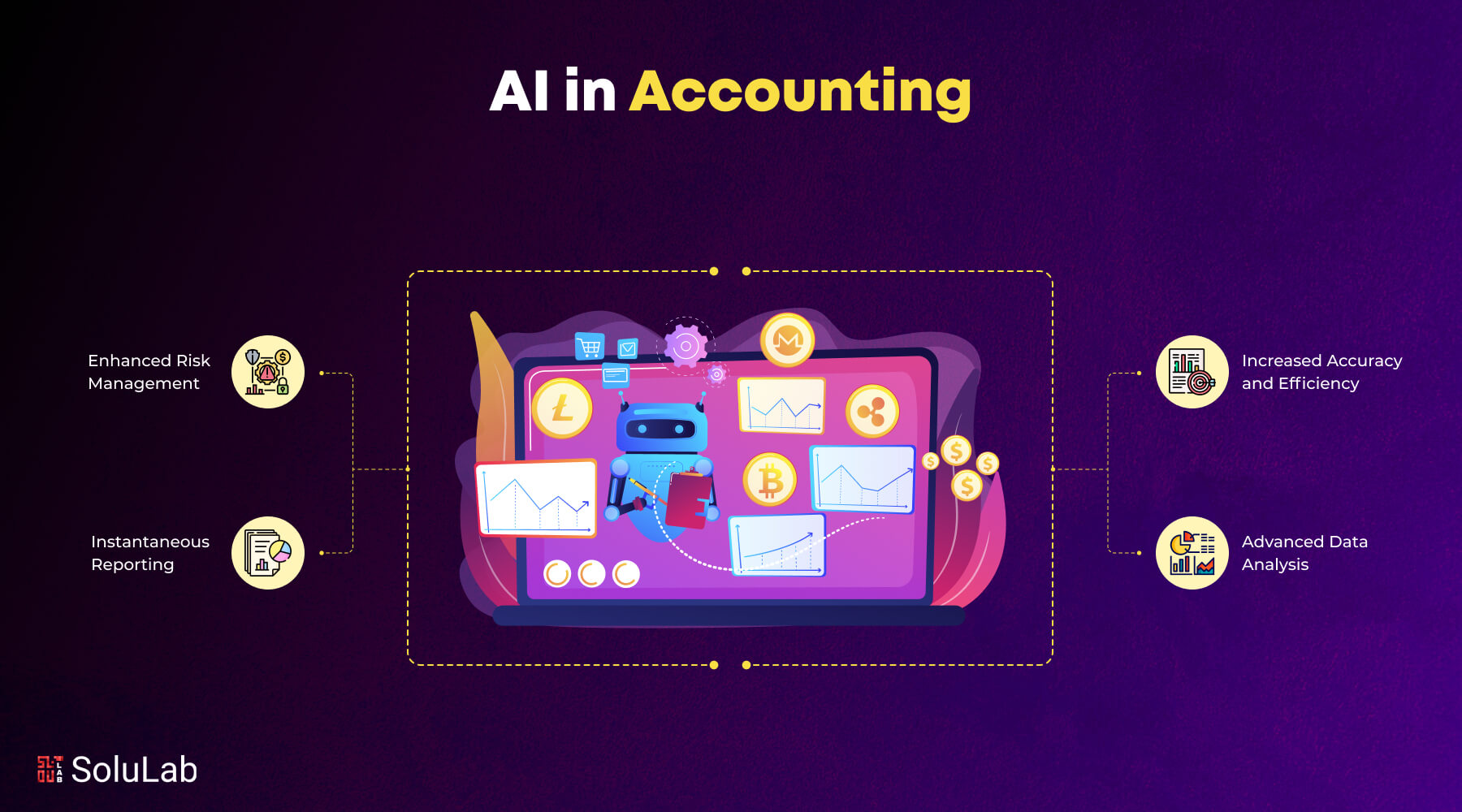
Artificial Intelligence (AI) is lately having a higher hand in all fields, and AI use in accounting is no exception. AI is helping people work with higher efficiency leaving fewer chances for errors that might take place manually. AI is a computer science software of accounting and artificial intelligence with human intelligence for better experiences in reasoning, learning, and decision-making. The rise of AI is transforming the traditional methods for getting things done. With the growing dynamics, it has become rather important for professionals to work smarter, more accurately, and faster in financial operations with the help of AI.
How is AI Used in Accounting?
The main use of AI in Accounting is for processing and data entry. ai for accountants
can take a lot of time to wrap up with the data management and processing which AI would do in much less time and with zero error rate. All this data is gathered from invoices, receipts, statements, and taxes. artificial intelligence accounting can be done using optical character recognition (OCR) and natural language processing (NlP) to extract and process the data accurately. Regarding this data, it becomes easy for AI to generate reports.
Another AI application in accounting is done with audit and compliance. Auditing is where the records are verified and examined as per laws and regulations. Earlier auditors used a sampling technique but now machine learning can analyze data, detect errors and frauds, and even provide recommendations.
One more way how to use AI in accounting is even for advisory and consulting because analyzing the data, gathering the information, and having a better sense of accuracy for future scenarios, artificial intelligence in accounting helps with providing the best pieces of advice and consulting for clients and stakeholders. AI is not a threat to accountants but a power to enhance capabilities. Companies that use AI-driven accounting processes can see a 20% reduction in manual errors.
Benefits Of AI in Accounting
There exists numerous benefits of ai in accounting and by leveraging these capabilities of ai accounting you can create improved experiences.
- Increased Accuracy and Efficiency
Specifically, artificial Intelligence accounting is useful in managing and efficiently handling certain trivial exercises that could easily consume a lot of an accountant’s time. Some of the best examples that can be classified under AI for accounting include data entry jobs, invoicing as well and bank reconciliation. The tasks mentioned above can be easily automated with the help of AI technologies and can save accountants time for more serious and important tasks, including client support and analysis of the business’s potential developments.
- Insights and Advanced Data Analysis
While financial data is replete with information, it is at times hard to come up with significant conclusions. With the help of Big data, accountants can acquire a detailed understanding of a business’s financial potential by using AI in accounting software to search for trends that are not detectable near-sightedly. Also suitable when it comes to taxes and credits.
- Enhanced Risk Management and Fraud Detection
Fraud is then defined as the unauthorized use of an organization’s resources whereby the gains accrued by the perpetrators are impressively remarkable to threaten the financial stability of an organization. Financial transactions might be constantly closely supervised by systems. AI in the accounting industry can detect suspicious behavior that does not correspond to a normative model. This means identifying payments that do not look right, issues with vendor invoices, or almost certainly, questionable payroll issues.
- Instantaneous Reporting and Determination
In the case of traditional accounting systems, there are always some forms of deferring when processing data and reporting, whereas AI for accounting enhances the speed of data processing and collection, hence the ability to real-time data of financial aspects. This bestows companies the power to act appropriately by having proper current financial information, AI applications in accounting are like knowing you could generate reports at the snap of your fingers or arrive at cash flow information within the blink of an eye.
Challenges of AI In Accounting

AI in accounting has numerous benefits, but there are some challenges you may face by indulging AI in the accounting industry.
- Security and Privacy Concerns
AI in accounting for your data analysis and management you are putting sensitive data at risk which becomes a potential challenge. So protecting data from unauthorized access, cyber threats, and breaches is extremely important to maintaining a security measure. These measures will help with safeguarding financial data and information against cyber threats.
- Ethical Considerations
Artificial intelligence accounting learns from the data in which they are trained which they then use to gain knowledge. This data may be prejudiced, which the AI system may reflect making the results prejudiced too. For instance, a training set that employed discrimination in the selection process may lead to discrimination in the employment of persons. Societal norms need to be incorporated into the systems that are being developed or trained to be AI systems.
- Cost of the Integration
AI solutions may be expensive; this is especially so where they are still innovative and have not been adopted and fully matured in the market. As much as Cube Intelligence is entering a growth marketplace with large potential, AI applications in accounting have many barriers that may limit its business activities in the beginning, which may include the capital outlay for recruiting people, buying an AI system, and possibly improving its IT systems. For this reason, businesses have to devise a clear and rational plan on how AI use in accounting will work and how the ROI of such an investment will be maximized.
- Preserving Expertise and Professional Judgment
Entirely, AI is good for data and automatism; nevertheless, it can never replace humans and their thinking, including in accounting. Ethical dilemmas, ethical decisions, and other detailed accounting situations require the knowledge and experience of humans. AI depends on the abilities of the accountant to assess the AI outputs and to identify issues, risks, and limitations of accounting and artificial intelligence while ensuring that such technologies work in parallel with accountants and do not eliminate professional judgment.
- Transparency and Explainability in AI Decisions
Some types of accounting and artificial intelligence can present a challenge because they have uninterpretable decision-making processes or various issues. By the same token, accountants need to understand how the systems come to the conclusions they make to uphold the concepts of decision-making transparency and accuracy. With the use of XAI approaches, one can build trust and offer supervision where needed with AI decision explanations.
Leveraging AI and Machine Learning In Accounting
With ML and AI, the accounting field is seeing total disruption. They are some of the most powerful tools that can significantly alter the course of handling, analyzing as well as utilizing financial data. By adopting AI & ML as accounting and AI technologies, accounting professionals will be able to step into this new world of higher accuracy, effectiveness, and, sophisticated decision-making.
- Automating Tasks That Repeat
The use of AI and ML to at least assist in automating operations that consume much of the accountants’ time is one of the biggest severities. Accounts payable, bank reconciliations, data entry, and invoice processing are some of the tasks that can be considered quite time-consuming, but they can be easily solved with the help of artificial intelligence for accounting technologies. From this, accountants can provide more time for higher-value operations such as financial analysis, client support, and analysis research. Imagine having the ability of AI where bills can be automatically read, compared with business rules, and then routed to the right person for approval. This would in effect, have a positive impact of increasing efficiency by using most of the available time productively for using AI in accounting and finance
- Better Data Analysis and More In-Depth Understanding
That is the actual strength of AI and ML, the benefits of AI in accounting are its capability to analyze huge amounts of data and derive patterns, and trends for businesses where they can make use of it and something that can help them make sound decisions about their company and understand possible risks in the environment or opportunities they can take They help a company or business have an overview of how financially sound they are. Picture the benefit of being able to identify potential ways of cutting operational costs by employing ML algorithms or the prospects of estimating future revenues when the program analyses the prior sales and trends of the market, accounting and AI allow accountants to work not only as record-keepers but also as strategists on companies’ sides.
- Fraud Identification and Risk Control
It is established that fraudulent activity has a severe negative impact on an organization’s financial stability, AI in accounting software and ML have the potential to create strong fraud detection systems. These programs can monitor financial operations during a certain period and indicate those as being rather suspicious. This means the ability to identify wrong, strange, or rather suspicious payments, vendor billing anomalies, or potential payroll discrepancies. He pointed out that, through the process of analyzing historical data and learning from previous fraudulent behaviors, such systems can become better developed at the identification of abnormalities. This brings quick action and minimizes the amount of lost money.
- Predictive Analytics and Businesses that Are Future-Proof
So, it is possible to draw powerful predictive analytics leveraging AI and ML in this regard, AI accounting may show a forecast picture of future financial results, cash flow, and probable risks taking into account past data and adding the market trends. Such knowledge allows firms to forecast their revenues and expenses and make decisions and investments that will be profitable in the given conditions. It is suggested to apply AI for accounting to predict changes in customer needs regarding the seasons or to detect potential economic crises and, therefore, to prepare for measures concerning costs.
Related: AI in Finance
- Better Customer Service and Tailored Guidance
As it is observed, while accountants are more engaged with their clients, AI performs many administrative tasks. This translates into better identification of the gap in clients’ needs, personalized advice on fiscal matters, and the ability to deal with difficult fiscal circumstances. Other applications of AI can also be applied to develop clients’ online working environment that provides secure access to their financial information and documents, which will enhance their interactions and improve the level of engagement. The capacity to offer an excellent service to the client will be one of the main strategies through which the organizations operating in the accounting market will compete.
How is AI Changing the Industry?
The impact of AI in accounting and finance is not only enabling accountants to work fast and smart but also opening possibilities for them to focus more on high-value activities that need more human interference, empathy, creativity, and relationship-building. Accountants can upskill themselves with AI applications in accounting and adapt to the changing environment at the workplace for thriving results.
The complete word of data entry can be easily handled by AI in accounting software which has reduced manual effort, time, and the risk of possible errors. OCR allows AI to extract only the exact and right information from relevant documents and then make an input. AI systems can integrate with payment gateways to process a real-time database.
Intelligent Financial Analysis is the key competency of AI in accounting and finance because no decision can be made without keeping a day-to-day financial track of clients and stakeholders. It is easier for AI to keep track of changed patterns, and vast data numbers to give relevant recommendations. AI also looks after security and compliance related to accounting and financial procedures by identifying possible risks associated with businesses and plans of clients as well as in financial bookkeeping. AI in accounting is cost-efficient With the growth of business, complexities grow too, but AI can notice them before and this helps in managing the costs and prevents losses.
Related: AI Use Cases and Applications
Future of AI In Accounting
With the growth of AI in the accounting industry the question will ai replace human accountants sure crosses our mind. But that’s too early to think AI for sure is a very powerful tool but will never be able to fulfill all the manual functions as well, it can never be a substitute for humans and their intelligence. What AI will continue with in the future is the completion of repetitive tasks which may be time-consuming and error-prone for humans. AI will always stand out in keeping large databases, recommending improvement by possessing profound knowledge of the history of clients and stakeholders.
It is easier for AI to keep up with the market trends and formulate policies for existing and new clients giving better experiences. The future of AI will be more of a right hand for the accounts but never a replacement. Streamlining workflow has been made easier with AI leaving more free space for working on strategic tasks requiring human intelligence. The future will witness the transformation of accounting practices alongside human intelligence.
Conclusion
Even with all the AI applications in accounting it might be too early to think of it as a replacement. In this blog, you can learn what AI is in accounting, and how exactly is it getting tasks done at a faster pace. The dynamics of conflict between AI and accountants are false because the future of accounting is a kind of teamwork, AI accounting might be the key that introducing change in accounting as a profession and upskilling the workforce to transform the provision of accounting services. This is a signal gain to the accounting professionals since they can assume the role of the financial architects of the future come up with the necessary plans and forward their valuable advice to clients while getting AI to undertake all the trivial ward work. The field of accounting will progress consequently with the help of human-AI integration which will help in reaffirming its worth and functionality in the rapidly growing economy. 90% of accountants see AI as a way to deliver more insight and value to business clients with a deep understanding of this SoluLab is providing services to upskill accounting functions with AI for you to keep up with the scale in this dynamic work environment. Contact us today to learn more!
FAQs
1. What is the use of AI in accounting and finance?
From summarizing contacts to keeping track of previous and recent activities and recommending more possibilities to existing customers according to the database of each AI works well for data numbers, vast information, forming policies, running investigations, and keeping audit checks.
2. Can AI for accountants be a potential threat?
Not a big threat, but with its ability to do repetitive and tedious tasks such as data entry AI can raise concerns about job displacement.
3. Can AI reduce costs in Accounting?
AI can reduce the manual need for analyzing and recording data resulting in fewer errors. It can also streamline accounting workflow and store data in the cloud or other digital platforms if required.
4. Can Artificial Intelligence be the future of Accounting?
A report given by ICAEW says 88% of accounting professionals believe AI will improve their working lives in the coming three years, this report makes it easier to understand how useful AI in accounting can be and continue to be.
5. How are the processes of AI in accounting complemented by SoluLab?
The implementation of AI from SoluLab brings more power to your accounting company. Protecting data is our main concern and analyze the process to automate it, develop new AI-based products, and use existing AI tools. To ensure that employees are optimally using AI, our company even provides training for the same. When you engage SoluLab, you will be opening the door to the accounting of the future.






